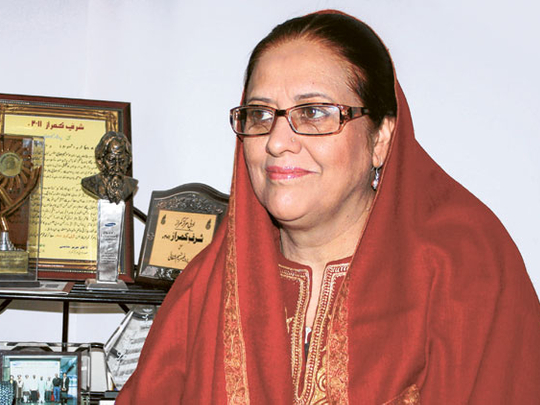
New Delhi: Kashmiri poetess Naseem Shafaie has been chosen for this year's Sahitya Akademi award in recognition of her work. She is the first Kashmiri woman to get the prestigious literary honour.
The poetry collection titled Na Thsay Na Aks (Neither shadow nor reflection) that won her the honour has been listed in the Kashmiri literature category and the award is in recognition of her contribution to the revival of Kashmir's long tradition of poetesses.
On promoting the literary traditions of her state, she says, "I am an optimist and the goals before me are challenging. I shall do whatever best possible I can to support Kashmiri language."
Many of her poems depicting the sense of gloom in Kashmir have been translated into different languages, including English, Urdu, Marathi, Kannada, Tamil and Telugu.
Naseem spoke to Gulf News on issues close to her heart. Excerpts:
GULF NEWS: Which poetic work of yours would you rate the best in terms of feelings and emotions vis-a-vis Kashmir state?
NASEEM SHAFAIE: It's not possible for any poet to rate one poem as the best. Every poem is an intricately woven fabric of my deepest thoughts and feelings, so it will not be fair on my part to pinpoint any one poem that I hold dear. The judgment is up to those who enjoy them. There are so many poems with different themes and they all have equal importance.
For instance, the first poem in my first collection, Baakh [The Cry] has its place in high order because of it being my very first work. It is about women and their insecurity in letting their children go out in Kashmir of the 1990s. Similarly, Tchandaw [Search] has its own significance in a different context. Du Vout [Forked Road] is also dear to me. Its opening lines are Na mumkin tchhun, mushkil tchu setha [Impossible it isn't, difficult it is], which depicts the Kashmir of my childhood and present times. Nida [The Oracle] is another one that I think is quite intense.
Is it because of the blood and tears shed by Kashmiris over the past two decades that you took to poetry?
No, I began writing in 1976-77, much before the turmoil.
Were it not for the turmoil in the state, what would have been the focus of your poetic thoughts?
The focus of my poetic thoughts, besides the pain in Kashmir, has been about the women of Kashmir. Had the situation been normal in the state, I would have continued writing about the women folk and would perhaps have focused on women in the subcontinent — their tears, sorrows, sufferings, joys, love and beauty.
What does the Sahitya Akademi award mean to you?
The award holds great importance. It is recognition at national level not only for me, but also for the place I represent, the Kashmiri language and women of Kashmir. It has been a long journey and I feel good to have made a place for myself in the world of literature.
When did you first start writing and what made you express yourself in poetry form?
I began writing in 1973, while I was in college. I contributed to the college magazine's Urdu section. But my teachers encouraged me to write in Kashmiri and I started doing so in 1976 during my university days. I believe it was my sensitivity to almost everything within me and the outside world that I was exposed to, which ignited my sensibilities. By God's grace, words became a bridge to my thoughts, feelings and expressions.
What kind of literary works are you drawn to?
I like reading short stories from different cultures and varied languages that are translated into Urdu and English. I also like to read epics and mythological narrations.
Your poetry addresses a wide range of issues from a woman's perspective. Would you say that women are a suppressed lot in your state?
The issues that haunt women become the thoughts and basis for my poetry. India is basically a male-dominated society and its high time things changed and women got due respect from men. After having seen the condition of women all over the subcontinent and also in Kashmir, I believe that their circumstances and life at the most basic level are almost the same everywhere. I am not talking about the elite class or the underprivileged. Come to think of it, the former are rather more suppressed in certain spheres than the latter.
But if we talk about the common women — from the masses, to which I also belong, I do not believe that women of my state are more suppressed compared to women of any other state.
What role are you playing to give life to the dying literary tradition of Kashmir?
I don't think that the literary tradition of Kashmir is on the verge of dying, though, yes, I have a role, as a daughter of Kashmir to keep it alive, as it is both — my mother tongue and identity as well. It would be an achievement if families were to speak, read and write Kashmiri and genuinely respect the essence of what this language has to offer.
The language has been introduced as a compulsory subject till Class 8 and it is optional after that. I would feel blessed if young mothers here were to teach their children to read and write Kashmiri alongside other aspects of life that they learn.
I also wish I could become a role model for every Kashmiri, especially the women.












